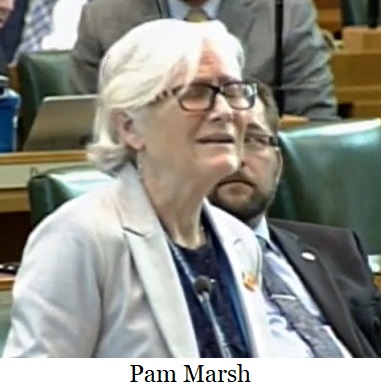Why should California get to have all the fun?
There are two sides to every scale. On one side you have uninterrupted electricity covering all situations. On the other side are customers that want to pay as little as possible for their electricity needs. The balancing act in the past has been the job of utilities monitored by Public Utilities Commission as an arm for customers. Over the last few legislative sessions, the PUC seems to have turned into the Political Utilities Commission reducing the consumer protection arm.
Rolling blackouts has been publicized as a risk of
HB 2021, a bill introduced in the last legislative session by Representatives Pam Marsh (D-Ashland), Khanh Pham (D-Portland), Senators Lee Beyer (D-Eugene), and Michael Dembrow (D-Portland). Seemingly every virtue-signaling Democrat jumped in as a co-sponsor. The bill sets a path for electricity providers to reduce emissions to 100% (80% by 2030, 90% by 2035 and 100% by 2040) below baseline by 2040, with intermediate targets. That goal is along with requirements for electric companies to develop a Clean Energy Plan meeting supply mix standard. The two together will not only drive-up costs, but make it more difficult for power companies to provide reliable energy in peak seasons.
Our neighbors to the south received their second taste of rolling blackouts this summer. The California Energy Commission laid blame in three main areas:
- A climate change-induced extreme heat storm across the West that spiked demand beyond current electricity demand planning targets.

- Growing amounts of renewable resources online, especially solar, that require other resources to help meet demand in the early evening hours when the sun goes down.
- Some practices in the day-ahead energy market exacerbated the supply challenges.
The first rolling blackouts took place in 2001, which almost affected the entire northwest. It was cause by drought conditions that reduced hydropower causing BPA to force 5,000 aluminum workers out of work to preserve power – an economic blow to the northwest. Oregon is currently struggling with the effects of drought
delivering water to Klamath County experiencing dry wells. Proposed dam removals further threaten their source of water and power.
The
Northwest Power and Conservation Council, authorized by Congress in 1980 under the Northwest Power Act, gives northwest states a voice in energy plans while protecting fish and wildlife resources. The Council has done an about face going from power plans driven largely by least-cost energy efficiency with only a modest development of renewable power in 2016 to clean-energy policies as a result of the aggressive pursuit of the Green New Deal and the climate change agenda. That resulted in the retirement of coal-fired generators, uncertainty about the role of new natural gas-fired generation, and a decrease in cost of utility-scale solar and wind generators. However, the Act directs the Council to give priority to cost effective energy efficiency, followed by cost-effective renewable resources. Not so easy when forces are mandating a zero-emission plan that we see in
HB 2021.
The Council acknowledges, “Increasing our dependence on sunshine and wind to make electricity has risks – primarily the risk of reduced output when the sun goes down and the wind stops blowing. Maintaining an adequate and reliable power supply will be challenging.†The Council’s
2021 Northwest Power Plan draft is available for
comment by November 19, 2021. The draft plan incorporates the results of several energy models, recently enacted public policies, advances in technology, and a blend of climate change assumptions and economics in preparing the 20-year plan and its action plan, which covers 2022 through 2027.
A D V E R T I S E M E N T

A D V E R T I S E M E N T
Will Oregon see rolling blackouts? Not if the Council’s suggestions are followed by increasing each utility acquisition to between 750 and 1,000 average megawatts by the end of 2027 and a minimum of 2,400 average megawatts by 2041, and the region needs to acquire 3,500 megawatts of renewable resources by 2027. That could be a tall order considering the restrictions in
HB 2021, and Governor Brown taking steps against it.
Governor Brown filed a preliminary injunction with the U.S. District Court over the management of the Federal Columbia River System. If the court approves her injunction, it would require lower Snake River dams and Columbia dams to spill water, which will significantly impact the hydroelectric power. The first spill is projected to cost more than $100 million a year resulting in a 5% increase in rates by Bonneville Power Administration. Additional spills will substantially increase greenhouse gas emissions putting a heavier burned on all utilities to meet the goals of
HB 2021 to be 100 percent carbon-free electricity below baseline emissions by 2040. What is hidden in the bill is the ban on expanding or constructing power plants that burn natural gas or fossil fuels, which makes up 21.1 percent of electric energy consumption in Oregon.
In the past year cities around the state have experienced power outages for various reasons including extreme weather and public safety power shutoffs. It is not hard to see why Oregonians are thinking rolling blackouts are inevitable. And it doesn’t take much to see that
HB 20211 can easily overload the grid without reliable backup systems. Will Oregonians be willing to pay more for less reliable electricity?
--Donna Bleiler| Post Date: 2021-10-19 06:01:33 | Last Update: 2021-10-18 10:58:44 |








